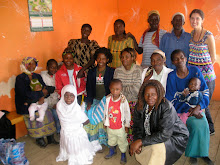From Kenya to Kazakhstan women artisans are transforming their families, communities and nations through the creation of craft initiatives. Once thought to be the role of male political leaders and regal diplomats women around the world are finding their voice and reclaiming their power through the making and selling of crafts.
In the slums of Korogocho, Kenya home to over 300,000 people living within one square mile lives Amina. Amina is HIV positive along with her 8 year-old daughter Nuria. Before becoming a part of a women’s beading group Amina sat alone in worry; her cupboards were empty, her children uneducated, and her will to live was limited. Now Amina is part of a women’s craft group, where each week 12 HIV positive single mothers gather under the blazing sun of Nairobi to make bracelets. Amina’s daughter is now in school, her cupboards are now full and she spends her days in gratitude for the community of women that surround her; reminding her of the strength that lies within when given an opportunity.
In the lowlands of Nepal 41 women gather six days a week to paint. They are part of a women’s cooperative and earn a living through the creation of traditional paintings. Before becoming a part of this cooperative these women were confined to their homes under the strict orders of their husbands; they had no creative outlet, zero rights, and were part of a debilitating caste system. Years later these 41 women have created their own cooperative, where women from different castes now work side by side and share a common vision for their lives and the lives of those around them. The creation of their paintings is now the primary source of income for the entire village. The self-sufficient women of this once enslaved village now leave their husbands at home as they venture out into the world of entrepreneurship.
Women artisans are weaving hope back into the nation of Swaziland where one in four people are HIV positive; the highest HIV/AIDS rate in the world. Phez’kwemkhono Bomake-Ncheka Cooperative was created as a means to support the women and children of Swaziland where over 56,000 children have been left orphaned due to AIDS. Created by a local Swazi woman in her village, this basket-weaving cooperative now employs over 50 women and funds food, education, and medical programs for child headed households throughout Swaziland while providing a living wage for the women artisans. The creation of this program has empowered these women and has decreased cases of domestic violence in their homes while earning the respect of elders in their village, the chief of this village now looks upon this cooperative for advice on how to govern the entire community.
These are just a few patches from the quilt that is collectively being sewn by women around the world. Women who were once victims of abuse, poverty, and limited education, women who once sat alone in their homes contemplating taking their lives, for they saw no hope. This silent voice started with the weaving of a basket and the beading of a bracelet and has turned into a powerful roar, a roar that is being heard around the planet, and a roar that is busting old beliefs and creating opportunities where there were once none.






